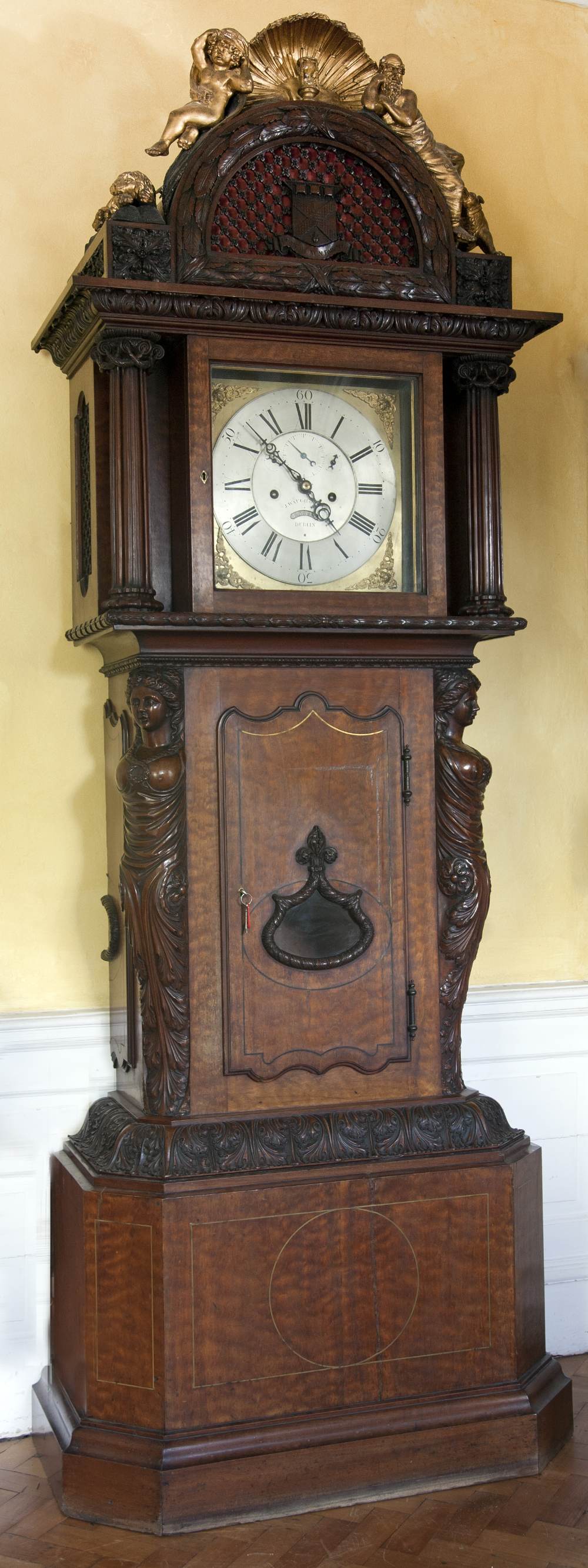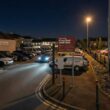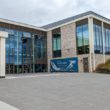
A grandfather clock crafted 220 years by a famous Armagh clock-maker has brought in well above the expected at an auction in Kilkenny.
The Francis Johnston Speaker Clock is something special.
It was formerly housed in Dáil Éireann – and chimes out ‘God Save The Queen’ every half hour!
And now it has been sold by Fonsie Mealy Auctioneers of County Kilkenny.
With a guide price of between €70,000 and €90,000, bids went way beyond expectations for what was described by the auctioneer as a “highly important and monumental mahogany Longcase Clock”.
In fact, it realised a fantastic €115,000 – or a cool £84,000!
The Francis Johnston Speaker Clock carries the Johnston Coat of Arms and motto reading ‘Nunquam Non Paratus’ above a later brass and steel dial, signed J. Waugh & Son, Dublin,
James Waugh was a member of a well-known family of clock makers. Indeed, he worked in Armagh from 1785 until 1805 when he moved to Dublin. He produced an ‘astronomical’ clock for use in the Armagh Observatory, around 1793, and assisted Robert Hogg in making an astronomical quadrant with a 35 inch radius. Hogg was later an assistant astronomer at Armagh.
In Dublin, James Waugh produced clocks from 157 James Street, under the name ‘Waugh & Sons’ as well as ‘James Waugh’ – this latter was in operation between 1805 and 1815. From 1820 until 1824 he operated from 24 James Street and, in 1825, moved to 40 Aungier Street. In 1826 a final move took him to 42 Aungier Street.
He is known to have made the works for a Longcase Clock nine feet eight inches high, by three feet eight inches wide, that was in the Irish Houses of Parliament.
Francis Johnston, after whom the clock is named, was responsible for the architectural design of Armagh Observatory and other local buildings of historical interest. He also designed the GPO building in Dublin.
The second son of William Johnston of Armagh, Francis Johnston, on the death of his older brother, Richard of Kilmore, became the head of his family and entitled to the undifferenced Arms, as displayed on the superstructure of this clock.
The Parliament House was sold in 1803 to the Bank of Ireland for £40,000. The conversion into the Bank’s headquarters was started the following year and completed in 1811. Francis Johnston was the architect of the alterations.
Between 1807 and 1814 Richard Stewart executed the carvings in the Chapel Royal at Dublin Castle, which had been designed by Francis Johnston and the unusual shape of the shield for the Johnston Coat of Arms, which was added to the Speaker’s Clock, is identical in form, to those for the Viceroys of Ireland, which Stewart carved in the Chapel Royal, Dublin.
The first Astronomer of the Observatory, Rev Dr JA Hamilton, was appointed in July 1790, and as an endowment for the Astronomer, Primate Robinson gave 20 acres of land and the estate of Derrynaught.
Several instruments, including a Ramsden transit instrument and meridian circle, a Troughton equatorial telescope and three clocks, were ordered at the Primate’s expense.
But owing to the Primate’s death before receipt of all the instruments, the two Ramsden instruments never came to Armagh. Compensating for their non-arrival, Armagh watchmaker, Mr James Waugh, constructed one, and observations with it began in July 1793.
Picture: Francis Johnston Speaker Clock, Fonsie Mealy Auctioneers.
Read more news:
Council chief urged to engage with Church on possible papal visit
Armagh 2002 All-Ireland winning team members supporting ICU fundraiser
Milford widow renews emotional appeal for return of husband’s stolen ring
Multi-million pound projects at ‘advanced stage’ – but more progress due!
Police say local businesses have fallen victim to UK-wide credit card scam
New Order to harmonise dog fouling penalties takes effect from today



